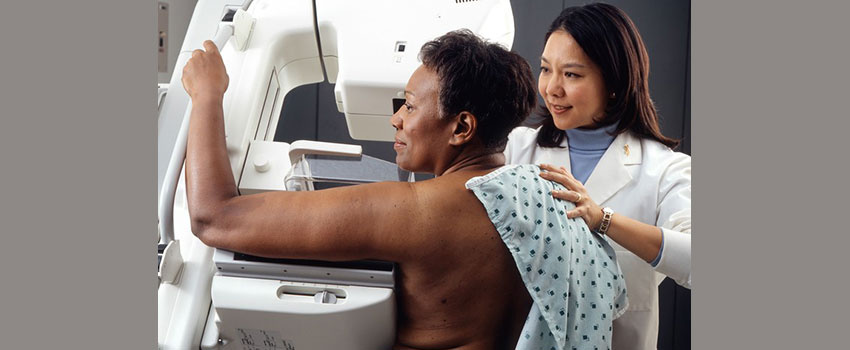Detection and Prevention
Early detection, through the use of screening methods, helps find cancers early when they are most treatable.
Discuss with your doctor concerns you may have around breast cancer screening – and share if you have a family history of cancer – so you can decide when it is best for you to begin. If your doctor already has recommended you to schedule a screening, call 734-936-4500.

Mammogram/Mammography
Mammograms are x-ray pictures of the breast that are effective for finding breast cancer. Mammograms can be used to check for breast cancer in women who have no signs or symptoms of the disease. This type of mammogram is called a screening mammogram. Mammograms also can be used to check for breast cancer after a lump or other sign or symptom of the disease has been found. This type of mammogram is called a diagnostic mammogram. Mammography is offered throughout University of Michigan Health in designated health centers and in the community with our Mobile Mammography Unit.
Breast Cancer Screening Guidelines
Screening guidelines for breast cancer vary depending on your age, family history and other risk factors, such as genetic links to cancer. The Rogel Cancer Center follows guidelines set by the National Comprehensive Cancer Network (NCCN).
If you have questions on risk and screening please call Cancer AnswerLine at 800-865-1125.
Breast cancer screening for average-risk women - Women ages 25 to 39
- Have a breast exam by your doctor every one to three years
- Pay attention to any changes to your breasts
- Ask your doctor for a breast cancer risk assessment
Women 40 and older
- Have a breast exam by your doctor every year
- Pay attention to any changes to your breasts
- Ask your doctor for an ongoing breast cancer risk assessment
- Have a screening mammogram annually
If you have questions on risk and screening please call Cancer AnswerLine at 800-865-1125.
Women at increased risk for developing breast cancer may benefit from different screening recommendations that may start at a younger age or include other forms of imaging, such as breast MRI.
Women may be considered high-risk for the following reasons:
- Family history of breast cancer
- Breast Cancer Genetic Syndrome (BRCA1 or BRCA2)
- Personal history of a breast biopsy showing atypical cells or lobular carcinoma in situ (LCIS)
- Receiving radiation therapy to the chest at a young age (for treatment of Lymphoma, for example)
For more information about breast cancer screening -- including guidelines for women at high-risk -- please visit Breast Cancer Screening Guidelines.
Questions/Concerns about Breast Density?
The Michigan Breast Density Notification Law requires radiologists to notify a woman and her primary care physician should dense breast tissue be identified on her mammogram. To learn more about breast density and how it may impact detection of breast cancer, please visit the Breast Density and Breast Cancer Risk webpage.
Learn more about breast cancer screening:
Call Cancer AnswerLine at 800-865-1125 with breast cancer risk or screening questions.
Why Breast Self Exams Are Now Optional
Michigan Medicine: Breast Imaging (Mammography)
National Cancer Institute: Mammograms
American Cancer Society: Mammograms
Michigan Health Blog: When Should You Get a First Mammogram? It’s Personal

